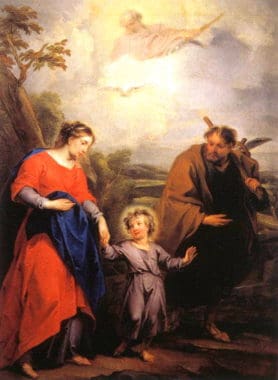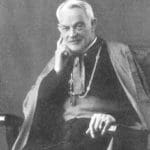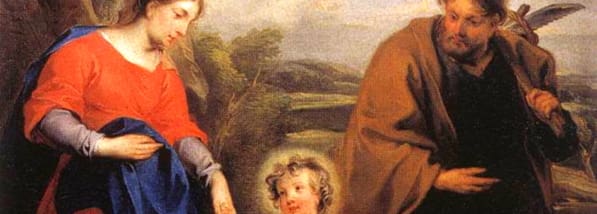THE RETURN FROM EGYPT
“Now Herod being dead, behold, an Angel of the Lord appeared in sleep to Joseph in Egypt, saying: Rise and take the Child and His Mother, and go into the land of Israel, for they are dead who sought the life of the Child. Who, rising up, took the Child and His Mother, and came into the land of Israel. But hearing that Archelaus reigned in Judea in the place of Herod his father, he was afraid to go thither, and being warned in sleep, he departed for the region of Galilee.”
Matthew 2:19-22
1. “Herod being dead!” It is no affair of ours to recall the career of this combination of worldly success and human misery, nor the facts of his utterly miserable end. There are few characters in history who might be taken as more typically personifying the character of Satan on earth; the evidently dominating will, the rule of terror, the fire within his very body, the hatred with which he is rewarded. This man is dead! The Angel does not mention his name; he does not even speak of him as an individual. “They are dead,” he says, “who sought the life of the child,” as if to draw all thought away from the man himself. He is dead, and at once the work of God revives. It can be checked, it cannot be stopped. There is always some seed left, and when the hindrance is removed it revives. Is there any greater proof of God’s work in the world than this its wonderful vitality?
 2. The Holy Family “came into the land of Israel.” But here again is one of those strange dealings of God with man. He had found it good to send an angel to order the return, and that to Israel; but would it not have been just as easy to say, “Go into Nazareth,” or “Go into Bethlehem,” as “Go into the land of Israel”? Why act so vaguely? Why leave to Joseph the solution of a needless doubt? The order had been given to go into Egypt, and thus a prophecy had been fulfilled; was there not another prophecy which said that “He should be called a Nazarene”? Yes; one may ask question after question, give reason after reason; we do but show that God’s ways are not our ways, but that for all that “He ruleth from end to end mightily, and disposeth all things sweetly,” both when He guides us clearly and when He bids us walk in the dark, leaving us apparently to our own devices.
2. The Holy Family “came into the land of Israel.” But here again is one of those strange dealings of God with man. He had found it good to send an angel to order the return, and that to Israel; but would it not have been just as easy to say, “Go into Nazareth,” or “Go into Bethlehem,” as “Go into the land of Israel”? Why act so vaguely? Why leave to Joseph the solution of a needless doubt? The order had been given to go into Egypt, and thus a prophecy had been fulfilled; was there not another prophecy which said that “He should be called a Nazarene”? Yes; one may ask question after question, give reason after reason; we do but show that God’s ways are not our ways, but that for all that “He ruleth from end to end mightily, and disposeth all things sweetly,” both when He guides us clearly and when He bids us walk in the dark, leaving us apparently to our own devices.
3. Joseph obeyed, but evidently not with out fear and trembling. His first intention was to settle at Bethlehem, as St. Matthew tells us; but prudence born of fear made him hesitate. He must choose for himself; he must bring his natural powers into play; it must have grown upon him by this time that the Child whose career he was to guide through life was to be marked but little by supernatural signs. Tradition has been so shocked at this that it has attempted to fill up the picture with miraculous events; but Scripture tells us nothing of them, and Joseph is left to his life of perfect faith and fidelity. So at least he is felt to be left, in almost every step of his career; but at the last he is guided to do the perfect will of God. It was so before the birth of Jesus; it is so now; it is so in the lives of all who have but the will of God before their eyes. Through the gloom that will always guides.
Summary Meditation Points:
- The work of God revives when the human hindrance is removed.
- God guides step by step; He will have us often walk in darkness.
- But He secures that the goal is reached.
 Editor’s Note: This meditation is from Archbishop Alban Goodier’s “The Prince of Peace” (1913).
Editor’s Note: This meditation is from Archbishop Alban Goodier’s “The Prince of Peace” (1913).




